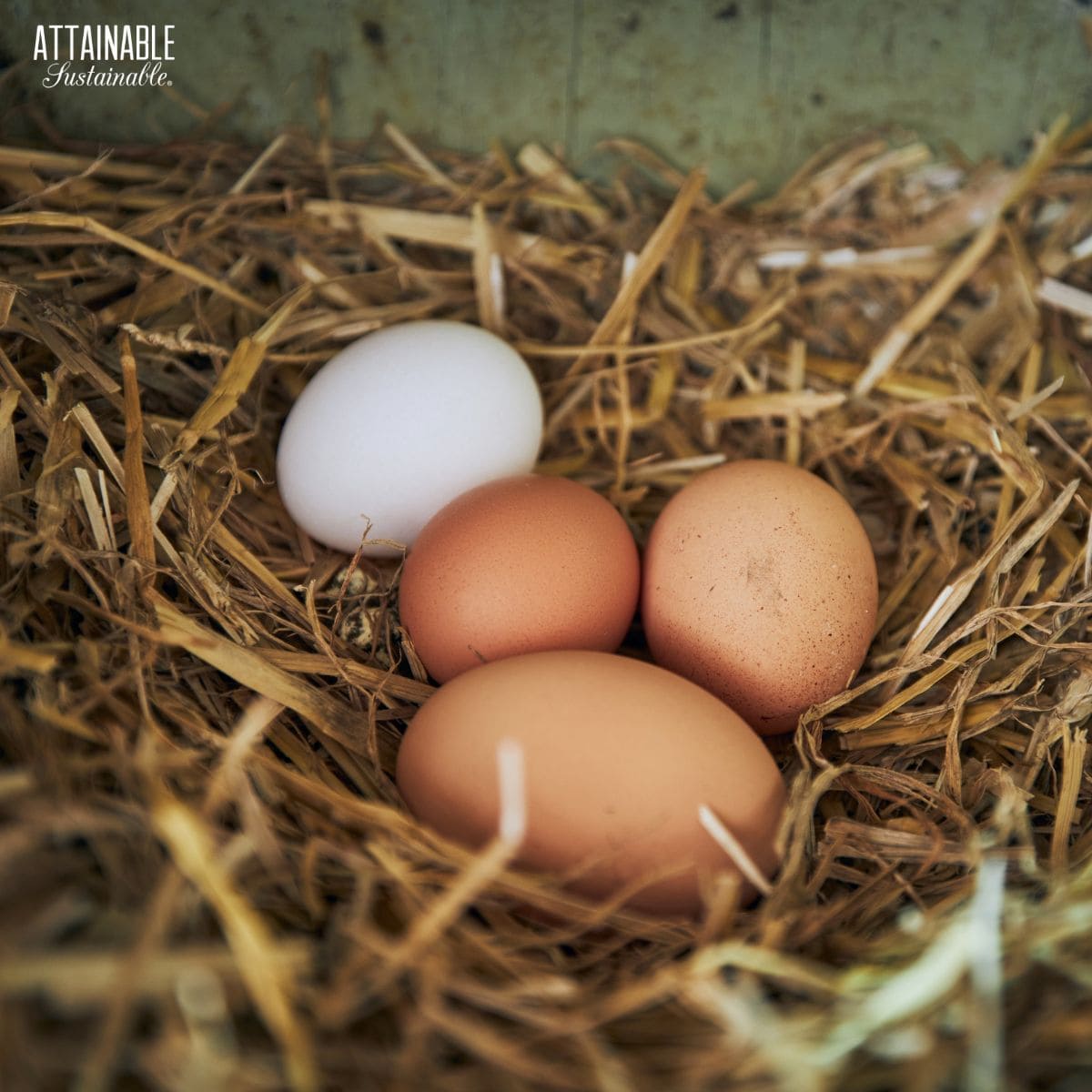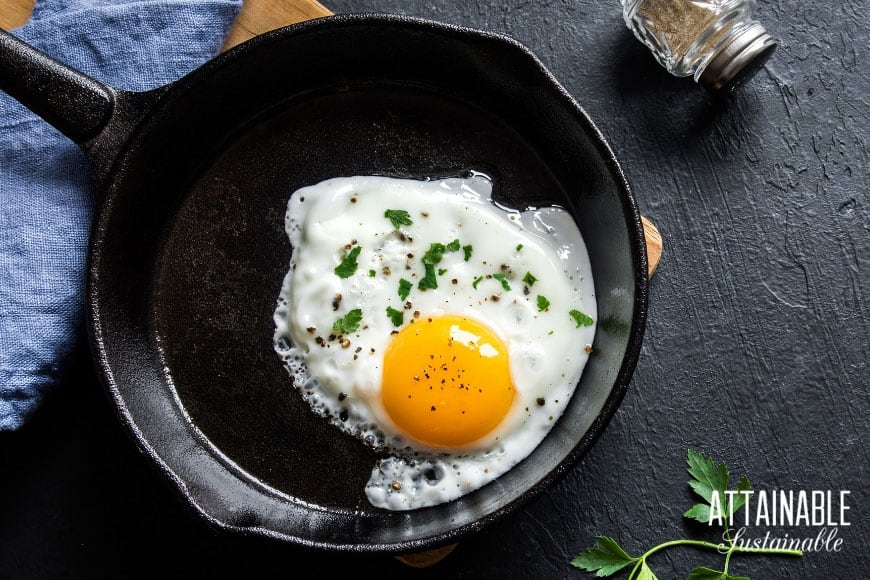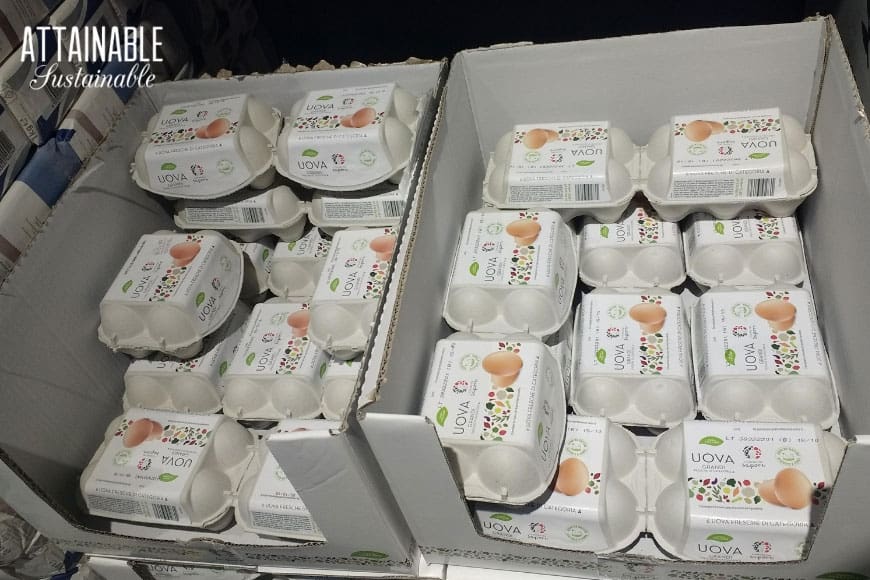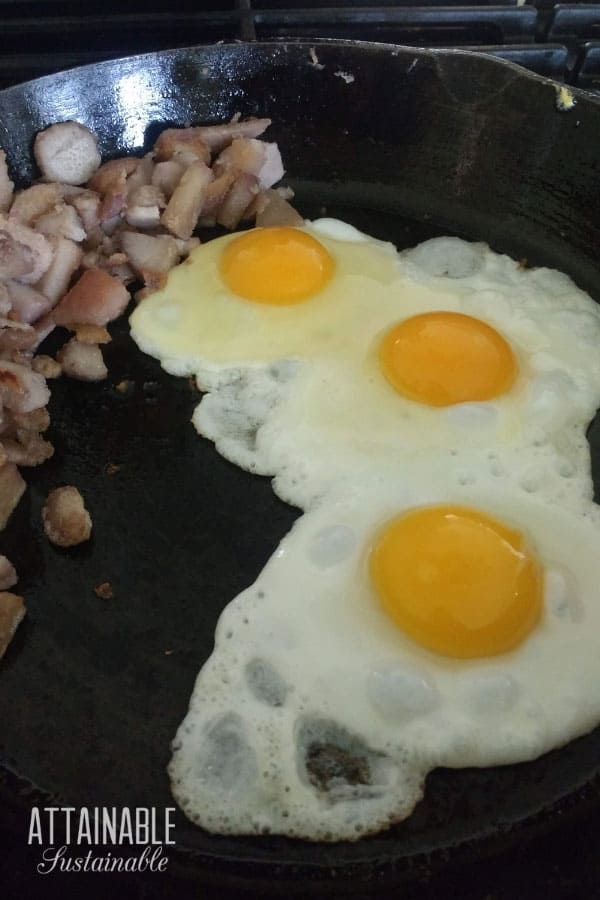There’s nothing like farm fresh eggs. Their rich, dark yolks make for perfect fried eggs, they’re great hard boiled, and oh, the custard. But when your chickens are producing lots of eggs, you might have trouble going through them fast enough and wonder just how long do fresh eggs last?
Originally published April 2019; this post has been updated.
Your Guide to Using Farm Fresh Eggs
The backyard chicken eggs that you pluck from the nesting box every day are as fresh as they can possibly be. Commercially produced eggs may be weeks old by the time you bring them home.
These rules apply to all eggs, but if you’re purchasing eggs at the grocery store, be mindful that they’ve already spent a fair amount of time in transit.
Refrigerating Eggs
One of the most debated aspects of fresh eggs is whether or not they need to be refrigerated. I don’t refrigerate mine, with only one exception (see below).
5 Easy Steps to Transform Your Pantry!
Ready to switch from store bought to homemade? Let me help you make some changes! Grab my FREE five-part guide to getting started.
Why, then, are eggs refrigerated at the grocery store next to the dairy products? That all depends upon where you’re shopping. If you’re an American shopping at a store in Europe, you’ll be shocked to see that eggs are not in the fridge section. (They also come in a variety of container sizes, not just by the dozen!)
Related: Understanding Eggs — Are Eggs Dairy? Are Eggs Meat?
The USDA requires producers to wash eggs with soap and hot water before sale. While this makes for clean eggs, it also removes the natural protective layer that eggs come with.
This natural bloom prevents the inside of the egg from coming into contact with bacteria outside of the egg. Since that protective coating is no longer functioning, American egg producers keep their eggs refrigerated from the farm to the store.
- Whether they’re commercially produced or farm fresh, store eggs that have been washed in the refrigerator.
- You can store fresh eggs eggs that have their protective coating intact — unwashed eggs — at room temperature. Keep them in a recycled egg carton or store them on one of these cuties until you’re ready to make a batch of these avocado deviled eggs.
How Long Do Fresh Eggs Last?
Longer than you think! According to the USDA, raw eggs in their shell have a shelf life that ranges from three-to-five weeks.
Commercially produced eggs come with a sell by date; you can safely eat eggs for two-to-three weeks beyond that date. That is — in my estimation — a conservative amount of time. They may very well last longer than that before they go bad.
Do Eggs Go Bad?
Yes, eggs go bad if not used in a reasonable amount of time. It doesn’t happen overnight, though. As eggs go bad, they slowly lose quality, but they don’t necessarily hit “rotten” stage on at the end of the fifth week. When raw eggs go bad, you’ll know it. Rotten eggs have a strong sulphur smell.
Be sure to take a minute to read up on why some people prefer duck eggs to those from a chicken.
What Happens if you Eat a Bad Egg?
If you crack one open you will find the odor terribly offensive; there’s really no risk of accidentally ingesting an egg that’s gone bad! If you do, though, you might find yourself with some stomach upset.
How to do an Egg Float Test
To avoid experiencing the stink of a rotten egg, there’s a simple float test for checking their freshness: Fill a deep bowl with cool water. Gently set eggs into the water to test them. Fresh eggs will sit on the bottom of the bowl, on their sides.
Those that are still good but a bit less fresh will remain under water, but stand on one end. If an egg floats during this test, dispose of it in an outdoor trash can or compost pile. It’s no longer good to eat and it will stink if you accidentally crack it open.
If your egg has passed the float test, you can cook it right away. If you’re not ready to use the eggs immediately, store these in the refrigerator. Putting them in water to test their freshness also removes the protective coating that allows them to remain safely at room temperature.
Washing Eggs
If you find a nest of eggs in the chicken coop that’s a bit less than clean — uh, poopy or muddy, it happens! — you’ll want to wash them.
I soak them briefly in a bowl of water, much as I would for an egg float test. This softens the yuck that’s stuck on the outside of the eggshell. Use your hands to wipe off the egg, and run it under cold water until it’s clean.
If you’re really concerned about it (say, you’re selling eggs and want them to be presentable) you can use one of those Magic Eraser sponges to carefully remove stains. Again, these washed eggs need to be stored in the refrigerator.
Have plenty of eggs? Be sure to check out this collection of egg recipes!












I have a question. We got eggs from a co-worker. My husband had left the eggs in the car for a few days. We had a frost over night and then they were brought back to room temp when he brought them into the house. Are these eggs still safe to eat after multiple temperature changes?
I’m not really sure about that!
I just found your site and it is very enlightening. Gonna check the library for your books. Thank you for sharing your wealth of ideas with others. Linda
You’re welcome 🙂
Hi Kris,
I was washing my eggs in cold water at first also but then read (on Manna Pro Egg Cleanser directions and some other places) it is safer to wash in warm water to avoid contaminants being absorbed through the shell pores.
Thanks for the great website I am so glad I found it!!
Pamela
Good tip, thanks for sharing!